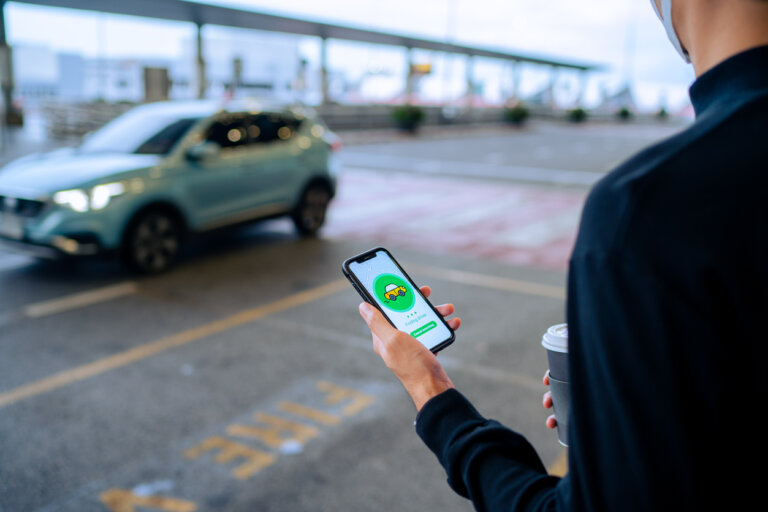Are you wondering how much your rideshare accident claim is worth? After all, these accidents can be complicated, and the legal process may seem daunting. Knowing what to expect regarding compensation for a rideshare accident is essential, so let’s take a closer look at understanding liability in such cases and filing an effective claim.
How much your rideshare accident claim is worth depends on many factors that our California rideshare accident lawyers discuss in this blog.
Understanding Rideshare Accident Claims
A rideshare accident is a type of motor vehicle collision that involves an Uber, Lyft, or other ride-hailing services. In the context of a rideshare accident, understanding the claims process involves examining what constitutes such an incident, potential damages recoverable, and any associated value.
To ascertain whether the incident is considered a rideshare accident, it is essential to evaluate such factors as the driver’s app status at the time of collision, who was driving, and if any third parties were involved.
Understanding Damages
In terms of damages, victims may seek compensation for medical bills, lost wages due to time away from work caused by an injury, pain and anguish resulting from physical injuries sustained in the crash, and any property damage incurred. In some specific cases, courts may also impose punitive damages.
The amount you could receive for your claim depends on several variables, including the laws regarding liability coverage requirements for drivers working under ride-hailing services like Uber and Lyft, as well as insurance policies held by both parties involved in an accident.
An experienced lawyer will have a comprehensive knowledge of local laws related to rideshare accidents, which can help maximize your potential settlement amount.
Economic Damages
Economic damages are losses that can be quantified in monetary terms. Lost income, medical expenses, and material harm resulting from another person’s carelessness can all be estimated in monetary terms.
Lost Wages
Lost wages refer to the income you would have earned if not for the accident or injury. Payments such as salaries, bonuses, and other remunerations that could have been acquired had the incident not occurred are encompassed in lost wages.
Medical Bills
Medical bills cover all costs associated with treatment related to your injuries, including hospital visits, surgery, medication, and physical therapy. It is essential to keep track of these costs immediately following an incident.
Property damage refers to any physical harm done to your personal belongings, such as a car or home, due to someone else’s negligence or intentional wrongdoing. In some cases, this could also include loss of use of items like a vehicle while repairs are being made due to an accident caused by another person’s carelessness.
Economic harm can be assessed as a monetary sum, such as lost wages and healthcare expenses. Non-economic damages refer to losses that cannot easily be quantified with a dollar amount, including pain and suffering or emotional distress.
Non-Economic Damages
Experienced attorneys recognize the worth of non-economic damages claims, such as pain and suffering, emotional distress, or loss of enjoyment of life, despite being difficult for juries to quantify due to their lack of tangible dollar values. These types of losses are often caused by another person’s negligence or intentional wrongdoing and can cause tremendous mental anguish in victims.
Non-Economic Damages can be a major factor in determining the value of your claim.
Punitive Damages
Punitive damages are imposed to discourage and penalize those who have acted carelessly or intentionally, thus ensuring that justice is served. Punitive damages are a way to ensure that those who act negligently or recklessly face accountability, even when criminal prosecution is not possible.
While not typically available in your average car accident case, punitive damages can be awarded for intentional wrongdoing or negligence, reckless disregard for the safety of others, or gross negligence.
Proving Liability in a Rideshare Accident
When proving liability in a rideshare accident, establishing negligence is key. This involves determining if the driver or another party acted carelessly or recklessly and caused an accident. Gathering data, including witness accounts, pics of the incident site, and documents from the rideshare business to decide who was liable for the crash, is vital in demonstrating negligence. Additionally, any available video footage can be used to determine fault.
Get the Help of an Experienced Rideshare Accident Attorney
When it comes to determining how much your rideshare accident claim is worth, the answer can vary. Economic damages such as lost wages and medical bills are easy to calculate, while non-economic damages, like pain and suffering or punitive damages, may require an experienced attorney who understands California law.
Contact our law firm today to discuss your rideshare claim. We’ll provide comprehensive solutions to help maximize your compensation and ensure justice is served.


